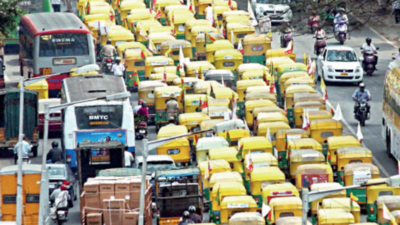Top Searches
- News
- City News
- bengaluru News
- How Bengaluru auto drivers are dumping meters & taking commuters for a ride
How Bengaluru auto drivers are dumping meters & taking commuters for a ride

There are around 1. 3 lakh autos in the city
BENGALURU: When was the last time an autorickshaw driver in Bengaluru agreed to ferry you by the government-fixed meter fare? How many times your requests to travel short distances were turn ed down outrightly? The good-old ‘wonandaff’ (one-and-ahalf fare above meter) requests have also died a quiet death as meters no longer figure in the picture.
There are around 1. 3 lakh autos in the city. In December 2021, the revised auto fares came into effect and the transport department had given drivers time till February 2022 to recalibra te meters. The minimum fare was increased from Rs 25 (for the first 1. 9km) to Rs 30 (for 2km). For every additional kilometre, it went up from Rs 13 to Rs 15. This was the first revision of fares since 2013. TOI lists a few reasons why meters are down and out in Bengaluru.
Skyrocketing auto LPG, CNG prices
A majority of the autos run on LPG. The auto LPG rate increased from Rs 32. 5 per litre in May 2020 to Rs 70 now. Some drivers shifted to CNG thinking it would be cheaper, but the price increased from Rs 49. 5 per kg in January 2021 to Rs 83 (at present). Drivers complain that while operational costs have gone up because of gas prices, there’s no adequate government subsidy to convert to electric autos. Also, there isn’t enough charging infrastructure.
No crackdown on errant drivers
Traffic police and the transport department used to conduct special enforcement drives against errant drivers. However, such drives are rare now. The department said they are short-staffed and traffic police records show that cases for refusal to ply reduced from 11,623 in 2020 to 363 in 2021. Till June this year, 658 cases were booked. Similarly, cases booked for demanding excess fare were reduced from 11,808 in 2020 to 644 in 2021, while 711 were booked up to June 2022. Transport department officials said traffic police have to initiate enforcement drives. While traffic police said the public could register complaints at 080-22868550 / 22868444.
Autos without permits, shortage of vehicles
As per the legal metrology department, only 45,964 autos in Bengaluru have recalibrated meters. Many, especially twostroke autos, are running without valid permits. Some drivers said since they pay a daily fine to traffic cops, they’re demanding extra to make up for losses. Some autos don’t have proper documents and are plying illegally. There’s also a shortage of autos after many financiers seized vehicles as drivers failed to pay EMIs due to a dip in ridership during Covid-19.
Lack of prepaid auto counters
There are no prepaid auto counters in crowded places like bus, Metro and railway stations, commercial areas/places, and hospitals. Most other cities have prepaid counters across the city. At present, only a few railway stations in Bengaluru have the facility.
Complaints of police harassment & traffic congestion
Some auto drivers complain that they are facing harassment from traffic police and often need to grease their palms. However, cops said they do not unnecessarily book cases. Many drivers complain that traffic congestion is high on arterial roads during peak hours so they are not able to get trips for operational expenses. In addition, many roads are filled with potholes so vehicles require constant maintenance. More one-ways and no U-turns coupled with traffic diversions caused by infrastructure work mean drivers spend more on gas.
There are around 1. 3 lakh autos in the city. In December 2021, the revised auto fares came into effect and the transport department had given drivers time till February 2022 to recalibra te meters. The minimum fare was increased from Rs 25 (for the first 1. 9km) to Rs 30 (for 2km). For every additional kilometre, it went up from Rs 13 to Rs 15. This was the first revision of fares since 2013. TOI lists a few reasons why meters are down and out in Bengaluru.
TimesView
One can only pity those relying on public transport. The frequency of buses is poor, app-based cabs are unreliable and, while autos at least had functional meters earlier, that is no longer the case and they are now left to the mercy of auto drivers. There is no doubt drivers are struggling due to rising fuel prices and daily expenses, but life isn’t easy for commuters either, many of whom have had salaries cut or been laid off. The government must provide more subsidies for drivers to shift to e-autos. This will be a winwin for all stakeholders.
Skyrocketing auto LPG, CNG prices
A majority of the autos run on LPG. The auto LPG rate increased from Rs 32. 5 per litre in May 2020 to Rs 70 now. Some drivers shifted to CNG thinking it would be cheaper, but the price increased from Rs 49. 5 per kg in January 2021 to Rs 83 (at present). Drivers complain that while operational costs have gone up because of gas prices, there’s no adequate government subsidy to convert to electric autos. Also, there isn’t enough charging infrastructure.
No crackdown on errant drivers
Traffic police and the transport department used to conduct special enforcement drives against errant drivers. However, such drives are rare now. The department said they are short-staffed and traffic police records show that cases for refusal to ply reduced from 11,623 in 2020 to 363 in 2021. Till June this year, 658 cases were booked. Similarly, cases booked for demanding excess fare were reduced from 11,808 in 2020 to 644 in 2021, while 711 were booked up to June 2022. Transport department officials said traffic police have to initiate enforcement drives. While traffic police said the public could register complaints at 080-22868550 / 22868444.
Autos without permits, shortage of vehicles
As per the legal metrology department, only 45,964 autos in Bengaluru have recalibrated meters. Many, especially twostroke autos, are running without valid permits. Some drivers said since they pay a daily fine to traffic cops, they’re demanding extra to make up for losses. Some autos don’t have proper documents and are plying illegally. There’s also a shortage of autos after many financiers seized vehicles as drivers failed to pay EMIs due to a dip in ridership during Covid-19.
Lack of prepaid auto counters
There are no prepaid auto counters in crowded places like bus, Metro and railway stations, commercial areas/places, and hospitals. Most other cities have prepaid counters across the city. At present, only a few railway stations in Bengaluru have the facility.
Complaints of police harassment & traffic congestion
Some auto drivers complain that they are facing harassment from traffic police and often need to grease their palms. However, cops said they do not unnecessarily book cases. Many drivers complain that traffic congestion is high on arterial roads during peak hours so they are not able to get trips for operational expenses. In addition, many roads are filled with potholes so vehicles require constant maintenance. More one-ways and no U-turns coupled with traffic diversions caused by infrastructure work mean drivers spend more on gas.
FOLLOW US ON SOCIAL MEDIA
FacebookTwitterInstagramKOO APPYOUTUBE
Start a Conversation
end of article










